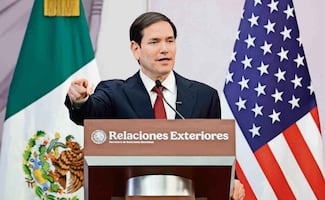Más Información

EU lanza ataque contra objetivos del Estado Islámico en Siria; Trump dice que es "represalia muy seria"

Clinton, Jagger y Michael Jackson aparecen en archivos de Epstein; pesquisa no es sobre el exmandatario, dice vocero

Corte Interamericana responsabiliza a México por feminicidio de Lilia Alejandra García Andrade; su madre ha luchado desde 2001

"Queremos cerrar este capítulo", dice Salinas Pliego al SAT; esperarán a enero a conocer fundamentos legales de adeudo fiscal

Marco Rubio destaca labor de seguridad de México; "están haciendo más que nunca en su historia", afirma

Hallan cuerpos en finca que ya había sido cateada en Silao, Guanajuato; suman 7 personas encontradas en menos de tres semanas
Mexico
is among the countries with the highest credit card interest rates in Latin America , surpassed only by countries with economies drowning in recession, such as Venezuela or Argentina and Ecuador , countries that left that phase this year.
On December 14, Mexico's Central Bank ( Banxico ) raised the benchmark interest by 25 bps to 7.25% per year, the highest percentage since March 2009.
The benchmark interest rate or base interest rate is the minimum interest rate investors will demand for investing in a non-Treasury security. It is also tied to the yield to maturity offered on the comparable-maturity treasury security that was most recently issued (on-the-run).
It influences the price paid by banks for lending money resulting in higher interest rates in consumer loans.
Banxico has raised the target rate by 425 bps since December 2015 , when it recorded a historical minimum of 3% .
Experts consulted by CitiBanamex anticipate that consumer prices will present an increase of 6.67% , being the highest inflation in the last 17 years.
The 7.25% benchmark interest rate in Mexico is higher than Brazil's, where it reaches 7 % and Chile's where it stands at 2.50% .
Mexico's benchmark interest rate is surpassed by Venezuela with 21.25% . Venezuela is the country with the highest inflation in the world, over 800%, and an economy in recession since 2014.
Argentina
's 28.75% and Ecuador 's 7.83% outstrips Mexico's benchmark interest rate as well.
José Luis de la Cruz Gallegos
, Director General of the Institute of Industrial Development and Economic Growth ( IDIC ) explained that higher interest rates inhibit private consumption and productive investment, because they depend, in part, on bank loans.
According to De la Cruz Gallegos, Banxico tries to contain the outflow of capital with interest rate adjustments by applying an orthodox policy that privileges financial stability over growth.
De la Cruz believes that interest rates will rise again in 2018 , although it will depend on inflation, depreciation of the exchange rate, interest rates in the United States , and the uncertainty on the future of the North American Free Trade Agreement ( NAFTA ).
According to the latest CitiBanamex survey, analysts expect Banxico's rate to rise again by 25 bps to stand at 7.50% during the first half of next year.
sg
Noticias según tus intereses
[Publicidad]
[Publicidad]








